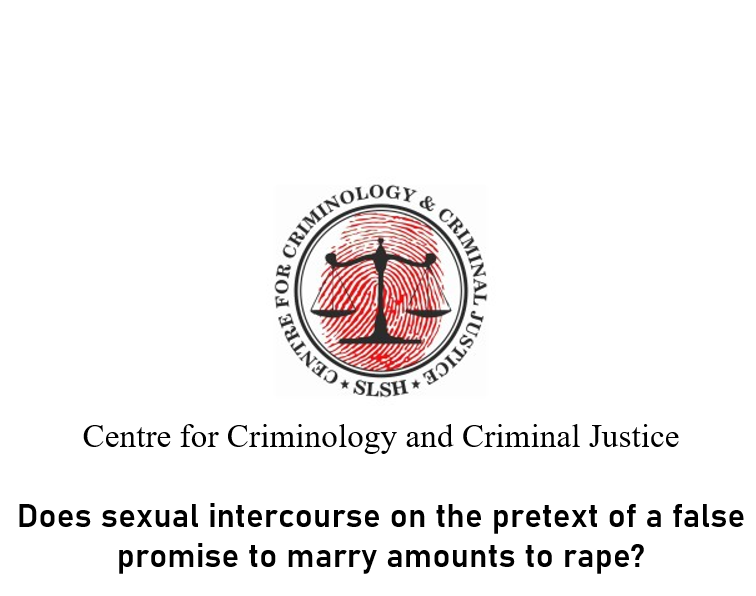
Does Sexual Intercourse on the Pretext of a False Promise to Marry Amount to Rape?
Introduction
“While a murderer destroys the physical frame of the victim, a rapist degrades and defiles the soul of a helpless female.”[i]
-Justice A Pasayat
The question of whether sexual intercourse on the pretext of a false promise of marriage by the accused often comes before the court of law as there is a lot of ambiguity in the interpretation of the law. There are numerous numbers of cases of a consensual relationship between men and women which later breakdown causing trauma in the life of the victim. Rape is considered the most reprehensible crime which adversely affects the mental as well as physical health of the victim.[ii] The law provides that the person taking consent of the prosecutrix for sexual intercourse on the pretext of false promise to marry her in the future amounts to rape within the ambit of section 375 of IPC.[iii] However, in several cases, the court has given the judgment in the favour of the accused or the person alleged to have committed rape. The primary reason given by the court is that the accused person obtains the consent of the victim. However, the Supreme Court of India recently observed that the consent obtained from the victim in such cases would amount to a misconception of fact and the consent would be vitiated. In the case of Pramod Suryabhan Pawar v. The State of Maharashtra, the SC held that “where the promise to marry is false and the intention of the accused at the time of making the promise was not to abide by it but to deceive the victim to obtain her consent for sexual intercourse, there is a misconception of fact within the meaning of Section 90 that vitiates the woman’s consent.”[iv]

Image Credit:
https://gumlet.assettype.com/freepressjournal%2F2021-03%2F1648ed16-a30b-438e-af43-6fd278914c80%2Fpexels_kat_jayne_568027.jpg?w=400&dpr=2.6
The legal position in India
The legal position of the law on sexual intercourse on the pretext of a false promise of marriage is ambiguous in India. There are several contradictions regarding the provisions of the law. There are also various judgments passed by the Indian judiciary which are contradictory and creates a lot of confusion regarding the law.
- Arguments in favour of the law
According to the strict interpretation of the law, sexual intercourse on the pretext of a false promise to marry would fall within the meaning of Section 375 of IPC. The reasoning behind the provision is that the consent obtained from the prosecutrix on the false promise of marriage would fall within the meaning of Section 375 of IPC which provides for the misconception of facts. Therefore, the consent obtained from the prosecutrix would be vitiated and the accused will be charged under the provisions of Section 375 of IPC. The Indian judiciary has passed several landmark judgments in favor of the law and observed that section 90 of the Code is required and relevant for application of section 375.[v]
In the case of Deelip Singh v. State of Bihar[vi], the Supreme Court held that “consent taken from the prosecutrix would vitiate if it was obtained on the pretext of a false promise of marriage by the accused. The court further observed that there was no consent or the consent obtained was involuntary in the instant case. It was a case of sexual intercourse against the will of the victim that would fall under the ambit of description “secondly” of Section 375 IPC.”
- Arguments against the law
There are various judgments and precedents which provide for the arguments against the law and enshrined that sexual intercourse on the pretext false of marriage would not amount to rape under the provisions of Section 375 of IPC. The primary reason is that section 375 is an exhaustive provision under the Code and it should be interpreted strictly without adding the new meaning to it. Further, it has been provided that section 90 of IPC cannot override the provisions mentioned under section 375 which is a specific penal provision. It is also argued that it is very difficult to prove the guilt of the accused person beyond a reasonable doubt. The real intention and motive of the accused person for not marrying the prosecutrix cannot be adduced by the court until and unless he was against the idea of the marriage from the starting of the relationship. It is required by the prosecution to establish the facts before the court of law that the accused has misled the prosecutrix to have sexual intercourse with him.
In Uday v. State of Karnataka[vii], the Supreme Court held that “the consent given by the victim to sexual intercourse with a person whom she is deeply in love on a promise to marry her in future, cannot be said to a misconception of fact under Section 90 of IPC and hence, the accused will not be convicted for rape within the meaning of Section 375. The court refused to give a straitjacket formula for determining the issue of whether the consent given by the victim to sexual intercourse is voluntary or whether it is given under a misconception of fact.”
Conclusion
The author concludes that there is a lot of ambiguity and confusion in the law regarding sexual intercourse on the pretext of a false promise of marriage. The author believes that there should be specific provisions added under Section 375 of IPC regarding this issue so that no one can abuse or exploit women in society. The loophole in the existing law undermining the rights of victims in society. These crimes are increasing day by day as the accused person believes that they would easily get away with their crime due to lack of specific provisions under criminal law. therefore, the law should not permit the accused person to abuse the innocent girls on the pretext of a false promise to marry and be acquitted later due to lack of any substantive law. Thus, sexual intercourse on the pretext of a false promise of marriage should be construed within the meaning of this particular section.
[i] Tulshidas Kanolkar v. The State of Goa, Appeal (Crl.) 298 of 2003.
[ii]Rupal Mathur, Analysis of laws relating to rape and false promise of marriage (March 10, 2021, 10:30 PM), https://ssrn.com/abstract=3407295
[iii] The India Penal Code, 1860- Section 375- Definition of Rape.
[iv] Pramod Suryabhan Pawar v. The State of Maharashtra SLP (Cri) No. 2712 of 2019.
[v] Surbhi Gupta and Rahul Guatam, Consensual Intercourse on false pretext of marriage if rape: A socio-legal study, 5 Indian Journal of Law and Human Behaviour 193-197 (2019).
[v] Surbhi Gupta and Rahul Guatam, Consensual Intercourse on false pretext of marriage if rape: A socio-legal study, 5 Indian Journal of Law and Human Behaviour 193-197 (2019).
[vi] Deelip Singh v. State of Bihar, Appeal (crl.) 44 of 2004
[vii] Uday v. State of Karnataka, (2003) 4 SCC 46.
Thanks to Mr. Kartik Bohra (Batch of 2018-2023) and the Centre for Criminology and Criminal Justice
Disclaimer : Any views presented in this blog are the personal views of the author and does not reflect the opinion of the institution.




